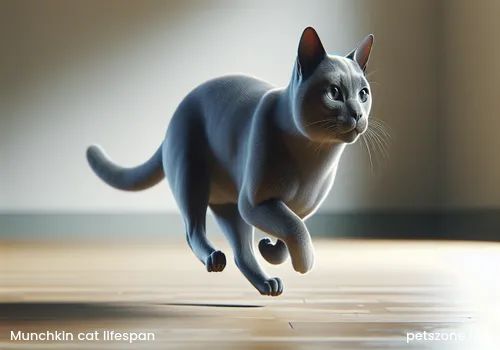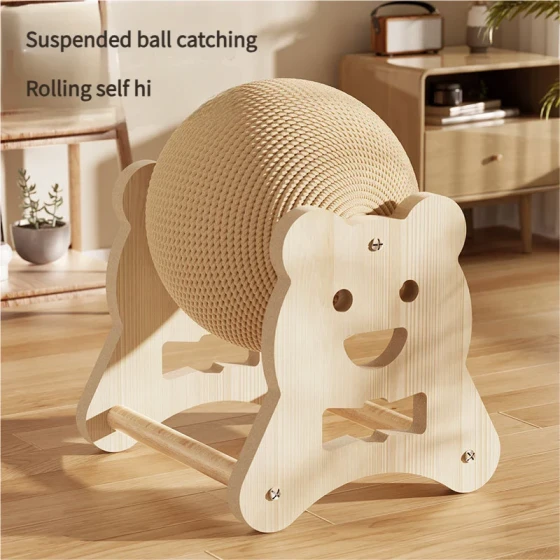How Long Can Munchkin Cats Live_Revealing the Average Lifespan and Care Points of Munchkin Cats
Munchkin cats, scientifically named Munchkin Cat, are loved for their unique short legs and often nicknamed the "Corgi of the cat world" or "Sausage Cat." They are lively, friendly, and curious, making them ideal pets for many. So, what is the lifespan of these "short-legged" cats? And what special care points should be noted?

Generally, the average lifespan of Munchkin cats is similar to most domestic cats, around 12 to 15 years. However, like humans, a cat’s lifespan is influenced by various factors including genetics, diet, living environment, daily care, and timely medical treatment. Therefore, scientific and reasonable feeding and attentive care are crucial in extending the lifespan of Munchkin cats.
The Uniqueness of Munchkin Cats
The most striking feature of Munchkin cats is their short limbs, caused by a naturally occurring gene mutation that leads to incomplete development of their leg bones. Despite their short legs, this does not mean they have difficulty moving. On the contrary, Munchkin cats are usually very lively and active, enjoying running and playing, sometimes darting as fast as ferrets. They also like to stand on their hind legs to observe their surroundings like rabbits.
Besides short legs, Munchkin cats generally have balanced body proportions with a sturdy and muscular physique. Their fur length, color, and patterns are diverse, covering nearly all types seen in cats. In terms of personality, Munchkin cats are generally considered friendly, intelligent, curious, and very affectionate pets. They enjoy interacting with humans and easily establish good relationships with family members and other pets. Some even describe them as dog-like in their tendency to follow their owners.
Factors Affecting Munchkin Cat Lifespan and Health Issues
Although the short-leg gene of Munchkin cats is a natural mutation and different from the congenital diseases seen in Scottish Fold cats, their special body shape may still pose some potential health concerns. If not properly managed, these issues could affect their lifespan and quality of life.
- Skeletal and Joint Problems: Due to their shorter legs, Munchkin cats’ joints may bear greater pressure. As they age, they may be more prone to osteoarthritis and other joint issues. While some believe that their spine is unaffected, others suggest that their short-leg, long-body structure might cause uneven spinal stress, increasing the risk of spinal problems. Some Munchkin cats may experience lordosis, an inward curvature of the spine, which can cause pain and mobility difficulties in severe cases.
- Chest Structure: Some Munchkin cats may have a narrowed thorax, affecting heart and lung function, especially causing breathing difficulties after intense exercise. Another congenital defect is pectus excavatum, where abnormal development of the sternum and ribs causes chest depression, which can compress the heart and lungs, requiring surgical treatment in severe cases.
- Obesity Issues: Although Munchkin cats are usually active, overfeeding or lack of exercise can still lead to obesity. Excess weight adds further strain to joints and spine, increasing disease risks.
- Other Health Issues: Like all cats, Munchkin cats may face common health problems such as urinary system diseases, hyperthyroidism, and dental issues.
It is worth noting that there remains some controversy regarding whether Munchkin cats are generally more prone to illness than ordinary cats and whether their short-leg gene negatively impacts overall health. Some international cat associations do not recognize the Munchkin cat as an independent breed and believe breeding animals with genetic mutations should not be encouraged. However, The International Cat Association (TICA) has recognized the Munchkin cat breed since 2003.
Care Points for Munchkin Cats
Scientific daily care is essential to help your Munchkin cat have a longer and healthier life.
- Diet Management: Providing nutritionally balanced, high-quality cat food suitable for the cat’s life stage is very important. Feed at fixed times and in controlled quantities to avoid obesity from overfeeding. Consider cat food or supplements rich in Omega-3 fatty acids to support joint health. Note that some human foods are toxic to cats and should be avoided, such as chocolate, onions, garlic, etc.
- Appropriate Exercise: Although short-legged, Munchkin cats are energetic. Provide plenty of toys and playtime to encourage moderate exercise, which helps maintain healthy weight and muscle strength. Provide low cat trees or other safe climbing and jumping facilities, but avoid high-intensity jumping or long-distance running to prevent excessive pressure on joints and spine.
- Daily Grooming: Munchkin cats vary in fur length; short-haired cats should be groomed once a week, while long-haired cats may require two to three times a week to prevent matting and reduce shedding. Due to their short legs, they may not be able to completely clean some parts themselves and may need owner assistance.
- Maintain Cleanliness: Regularly trim nails and clean ears and eyes. Some Munchkin cats may get feces on their hindquarters due to their short legs and need timely cleaning.
- Regular Veterinary Checkups: Take your Munchkin cat to the vet regularly for health exams and vaccinations to detect and treat potential health issues early.
- Provide a Comfortable Environment: Provide a safe and comfortable living environment, avoiding exposure to dangerous items and toxic plants. Choose flat and long litter boxes for easy access.
- Mental Health: Munchkin cats are social animals that enjoy companionship and may feel lonely if left alone for long periods. Spend time playing and interacting with them daily, paying attention to their mental health to help extend their lifespan.
Frequently Asked Questions
- Are Munchkin cats’ short legs a genetic defect? The short legs of Munchkin cats are caused by a naturally occurring gene mutation leading to abnormal bone development. Some consider this a defect and discourage breeding, while others believe that with proper breeding, they can lead normal lives.
- Are Munchkin cats prone to illness? Munchkin cats may be more susceptible than ordinary cats to skeletal and joint diseases like osteoarthritis and lordosis. However, good care and regular vet checkups can help maintain their health.
- Can two Munchkin cats breed with each other? It is not recommended to breed two Munchkin cats, as embryos inheriting two copies of the short-leg gene often die in the womb or shortly after birth. Usually, Munchkin cats are bred with normal-legged cats.
Summary
Overall, the average lifespan of Munchkin cats is similar to ordinary domestic cats, around 12 to 15 years. Although their short legs may pose some potential health risks, especially concerning bones and joints, this does not mean they are destined to live short or painful lives. By providing a balanced diet, appropriate exercise, meticulous daily care, and regular veterinary checkups, we can maximize the health of Munchkin cats and let these adorable little companions leave more beautiful "cat" life traces around us. Caring for Munchkin cats requires more attention and investment, but the joy and companionship they bring are priceless treasures for many cat owners.
-560x560.webp)


